Since I'm now working out in the sticks, I thought I'd see more of what's out here there in the vast rural wasteland east of the city. I've mostly been hitting the outdoor highlights to avoid people, but after a harrowing encounter with a cow out in the wild, I thought my next stop should be a little more indoorsy. So last week I stopped by the
Mulberry Phosphate Museum. Small town! Big industry! Informational exhibits! What could go wrong?
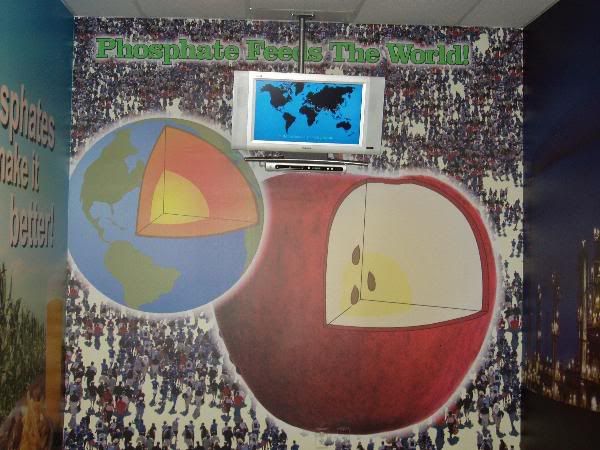
Phosphate is a huge industry in Florida, possibly as big as citrus or Disney. According to the
Florida Institute for Phosphate Research, the state supplies 75% of the country's phosphate and 25% of the world's. Phosphate is an important fertilizer and does other science-type stuff. I found a book here in the library called
The Florida Phosphate Industry by Arch Frederic Blakey. The book jacket warns: "Long before carbon, nitrogen, or oxygen supplies become critically short, the supply of phosphorous will be exhausted. When this happens, Professor Blakey assures us, life will end." That's right,
life will end. Thank you Professor Blakey for reminding us to
thank God we live in a world of phosphate.
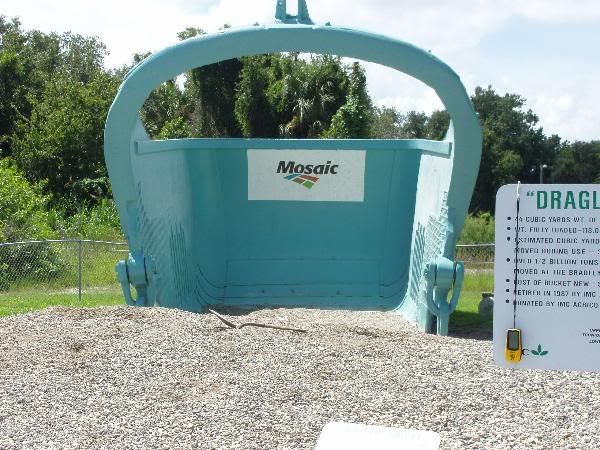
As you might imagine, it isn't all positive. Phosphate mining gouges the land with giant scoops called dragline buckets. It can cause some nasty air and water pollution and even produce deadly radon gas. And, like any industry, the history of Florida phosphate mining is full of incidents like the 1919 miners strike in Mulberry that climaxed in a gunfight between strikers and mine guards whose victims included a two year old child.
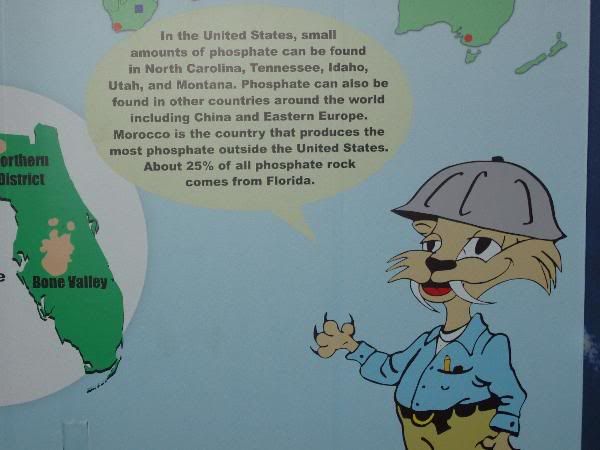
But you won't learn any of that at the Mulberry Phosphate Museum. Instead, you'll meet Smiley the
Smilodon and have the official line spoonfed to you by an anthropomorphic sabertooth. I realize that modern trends in museum studies have not quite filtered down to Mulberry, but this isn't merely poor scholarship, this is industry propaganda. I don't exaggerate, it was literally
bought and paid for by the phosphate industry. One wall is devoted to a vehemently defensive set of "facts" about the industry assuring us that yes, phosphate is safe, and no, they're not going to tear the hell out of Charlotte County (three counties south of Mulberry) like they did this one. What else does the phosphate industry have to tell us?

Phosphate makes happy cows!
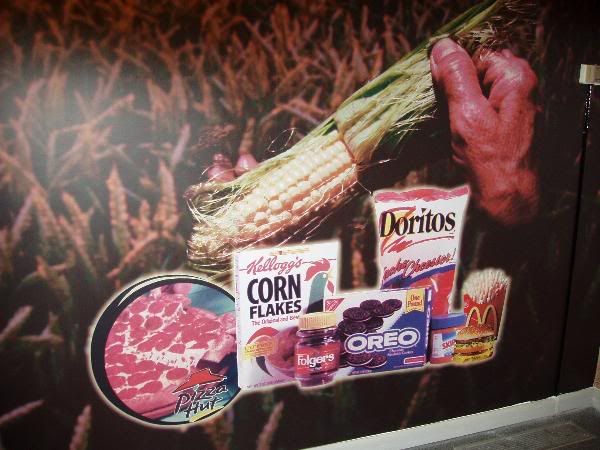
Phosphate makes happy food like these products from the sponsors of this exhibit. Go be a good consumer now.
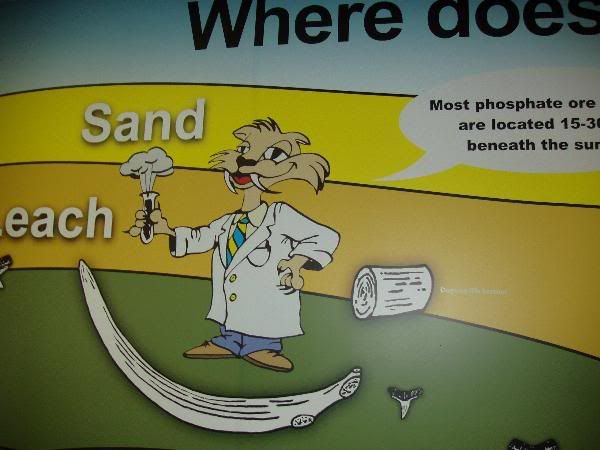
Smiley does science!

Bye Smiley!
 Phosphate is a huge industry in Florida, possibly as big as citrus or Disney. According to the Florida Institute for Phosphate Research, the state supplies 75% of the country's phosphate and 25% of the world's. Phosphate is an important fertilizer and does other science-type stuff. I found a book here in the library called The Florida Phosphate Industry by Arch Frederic Blakey. The book jacket warns: "Long before carbon, nitrogen, or oxygen supplies become critically short, the supply of phosphorous will be exhausted. When this happens, Professor Blakey assures us, life will end." That's right, life will end. Thank you Professor Blakey for reminding us to thank God we live in a world of phosphate.
Phosphate is a huge industry in Florida, possibly as big as citrus or Disney. According to the Florida Institute for Phosphate Research, the state supplies 75% of the country's phosphate and 25% of the world's. Phosphate is an important fertilizer and does other science-type stuff. I found a book here in the library called The Florida Phosphate Industry by Arch Frederic Blakey. The book jacket warns: "Long before carbon, nitrogen, or oxygen supplies become critically short, the supply of phosphorous will be exhausted. When this happens, Professor Blakey assures us, life will end." That's right, life will end. Thank you Professor Blakey for reminding us to thank God we live in a world of phosphate. As you might imagine, it isn't all positive. Phosphate mining gouges the land with giant scoops called dragline buckets. It can cause some nasty air and water pollution and even produce deadly radon gas. And, like any industry, the history of Florida phosphate mining is full of incidents like the 1919 miners strike in Mulberry that climaxed in a gunfight between strikers and mine guards whose victims included a two year old child.
As you might imagine, it isn't all positive. Phosphate mining gouges the land with giant scoops called dragline buckets. It can cause some nasty air and water pollution and even produce deadly radon gas. And, like any industry, the history of Florida phosphate mining is full of incidents like the 1919 miners strike in Mulberry that climaxed in a gunfight between strikers and mine guards whose victims included a two year old child. But you won't learn any of that at the Mulberry Phosphate Museum. Instead, you'll meet Smiley the Smilodon and have the official line spoonfed to you by an anthropomorphic sabertooth. I realize that modern trends in museum studies have not quite filtered down to Mulberry, but this isn't merely poor scholarship, this is industry propaganda. I don't exaggerate, it was literally bought and paid for by the phosphate industry. One wall is devoted to a vehemently defensive set of "facts" about the industry assuring us that yes, phosphate is safe, and no, they're not going to tear the hell out of Charlotte County (three counties south of Mulberry) like they did this one. What else does the phosphate industry have to tell us?
But you won't learn any of that at the Mulberry Phosphate Museum. Instead, you'll meet Smiley the Smilodon and have the official line spoonfed to you by an anthropomorphic sabertooth. I realize that modern trends in museum studies have not quite filtered down to Mulberry, but this isn't merely poor scholarship, this is industry propaganda. I don't exaggerate, it was literally bought and paid for by the phosphate industry. One wall is devoted to a vehemently defensive set of "facts" about the industry assuring us that yes, phosphate is safe, and no, they're not going to tear the hell out of Charlotte County (three counties south of Mulberry) like they did this one. What else does the phosphate industry have to tell us?



No comments:
Post a Comment